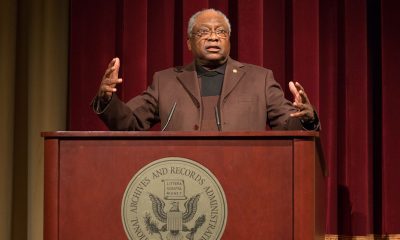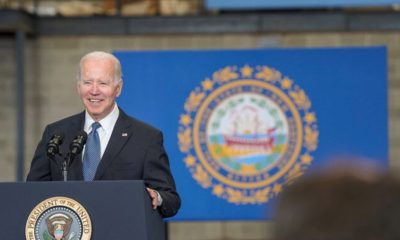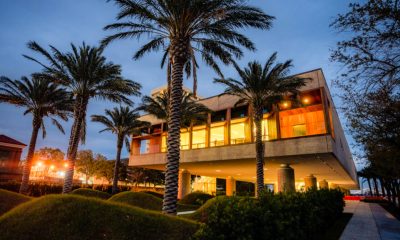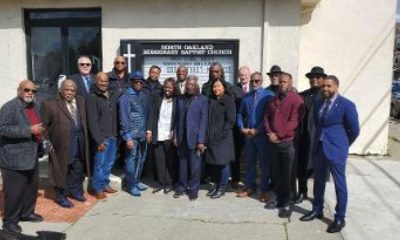Religion
Black Christians and Muslims Unite Around Burned Churches
By Jazelle Hunt
NNPA Washington Correspondent
WASHINGTON (NNPA) – In the last week of June, as the nation was still mourning and mulling over the massacre at Emanuel A.M.E. Church in Charleston, S.C., seven other Black churches across the South went up in flames.
Solidarity came out of the ashes.
Since July 2, the Respond With Love campaign has raised more than $66,000 and counting toward rebuilding the churches. The Muslim-led fundraiser is a joint effort between Ummah Wide, a global digital media storytelling organization for and by young Muslims; MuslimARC, which combats racism within the Muslim diaspora; and the Arab American Association of New York.
As the reports of the fires spread to the masses, Chicago resident Faatimah Knight and her friend David Craun, founder and executive director of Ummah Wide, felt they had to do something. They began a fundraiser on LaunchGood.com, hoping to raise $10,000 to contribute to a general outpouring. Over the next day, Knight, Craun, and leaders of the other groups teamed up.
“I feel this was racially motivated crime, and being a Black person, I naturally feel implicated. Even though I’m not Christian, I’m still Black – I’m still a part of that target group,” Knight says, adding that she also has Christian friends and family to worry about.
A flurry of media coverage and the month of Ramadan, which began the day after the Mother Emmanuel attack, boosted the campaign’s profile. In 12 hours, donations swelled past the original $10,000 goal. The bar was raised to $30,000, then to $50,000, and currently to $75,000, as donations keep coming in.
“It’s a time of year when Muslims are hyper-aware of their faith and their duties to others, their duties to God,” Knight explains. “At Ramadan, Muslims spend so much time at mosque. It’s a time when we value our place of worship more than any other time. I can definitely empathize with someone having that taken away.”
Since the September 11 attacks, mosques and Muslim communities have remained targets of racial and religious hatred. During Ramadan 2012, an arsonist who identified as a conservative Christian Iraq veteran burned the Islamic Center in Joplin, Mo. to the ground. It was his second attack that summer on the same center.
In April, former Tennessee Congressional candidate, Robert Doggert, was arrested for planning a violent, burning-shooting attack on a Muslim community in upstate New York. In May, “patriots” in Dallas and Phoenix launched Muhammad drawing contests and armed demonstrations outside of mosques.
Namira Islam, executive director of Detroit-based MuslimARC, says the church burnings remind her of both the attacks on mosques and the history of Black church burnings and bombings.
“Our mosques have been attacked. There are mosques that have been burned down, too. In that sense, all of our fates are intertwined. It’s happening again – knowing the history behind…Black church burnings in the U.S. It’s outright terror,” she says.
“When you think about fire, something like arson…. It’s a hate crime. Obviously, there is a legal definition involved, but the act is very hateful.”
Black churches have been burned, bombed, or otherwise threatened regularly since Emancipation, with spikes during the Civil Rights Movement and again during the 1990s – to the point that President Bill Clinton created the now-defunct National Church Arson Task Force.
One study published in the official journal of the National Association of Social Workers found more than 300 racially motivated church bombings or burnings in the 1960s, and an additional 200 between 1989 and 1996. After President Obama’s election in 2008, two White men were convicted of burning down Macedonia Church of God in Christ church in Springfield, Mass. in response.
Three of the seven torched Black churches have been declared arson: College Hill Seventh Day Adventist Church in Knoxville, Tenn., God’s Power Church of Christ in Macon, Ga., and Briar Creek Road Baptist Church in Charlotte, N.C. None are being investigated as hate crimes.
The FBI says a lightning strike started the fire at Mount Zion AME in Greeleyville, S.C., the last of the seven churches lost. In 1995, two Ku Klux Klan members burned it down; when it was rebuilt a year later, Clinton visited and made a speech on racism.
The fire at Fruitland Presbyterian Church in Fruitland, Tenn. was also attributed to lightning. The cause of Glover Grove Baptist Church’s fire, in Warrenville, S.C. remains a mystery. At Greater Miracle Temple Apostolic Holiness Church in Tallahassee, Fla., investigators say an electric accident after a thunderstorm felled a tree and downed power lines was to blame.
Knight says that the shared experience of being targeted isn’t the only connection between Muslims and Black Christians.
“[The Quran says] you’ll find some of the closest people to you are Christians, because they are humble and not arrogant,” she says, referencing Quran verse 5:82. “In our own Scripture, God praises another group for their character. Trying to live out those words is important.”
In addition to the Respond With Love fundraiser, the Christ Church Cathedral in St. Louis, Mo. has launched a national fundraising effort that has earned almost $160,000 so far and counting. Simultaneously, nearly 200 churches, mosques, and synagogues around the country have also pledged to take up a special offering this month in connection with the campaign.
Some of the Respond with Love donations went toward floral arrangements for each of the surviving family members of the nine people killed at Emanuel AME Church. MuslimARC is also providing educational resources on the history of White supremacist terrorism against Black churches, and other opportunities for those who cannot donate but want to help. Ummah Wide members, including Knight, are discussing the possibility of visiting one of the churches to help with construction.
Knight and Islam say they have been in minimal contact with some of the leadership of the affected churches, but that the congregations are still processing the tragedies and figuring out logistics. In the meantime, the organizers are deciding how best to distribute the funds once the campaign closes on July 18.
“Churches are places where God’s name is remembered. When a place where people praise God is taken away, that creates a void,” says Knight. “I didn’t want [the fires] to be the end of the story.”
#NNPA BlackPress
COMMENTARY: Prayer is Your Power
Terrible things happen to good people often. We live in an unjust world with people making decisions that are informed more by profit than people. We cannot take those principles into our relationship with God. We must believe that “… all things work together for good to them that love God, to them who are the called according to His purpose.”
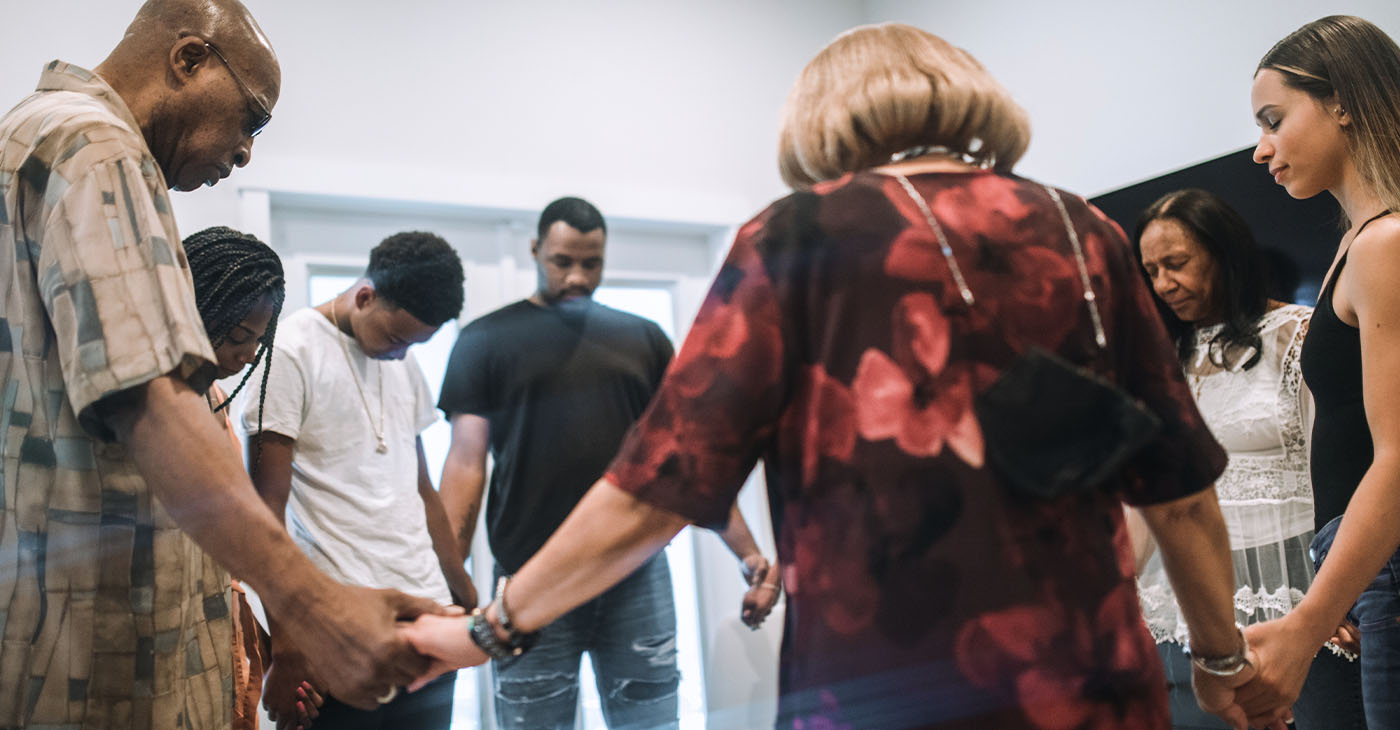
Faithful Utterances
By Dr. Froswa Booker-Drew | Texas Metro News
This week, a friend informed me that she was following the ambulance to the hospital with her husband. Her husband was going through a major health crisis. She wasn’t the only one who reached out—a friend’s mother had unexplained pain and another friend contacted me about her friend’s son who was hospitalized with pneumonia. Each of them asked that I pray for them.
I consider it an honor to pray for others. Prayer is powerful and I love that I have a group of friends who I can turn to that I call the “prayer warriors” that when I send a text to lift up the concerns and issues of others before God, they go into battle mode.
Prayer is a weapon and I think many of us don’t understand its power until we need it. For many of us, it’s a routine, something that’s more about religion than it is about relationship. We have gotten prayer twisted as some exchange solely for stuff. God is not a celestial Santa Claus dropping off gifts. Prayer is an opportunity to go before to God sincerely in relationship. “And when you pray, you must not be like the hypocrites. For they love to stand and pray in the synagogues and at the street corners, that they may be seen by others.
Truly, I say to you, they have received their reward. But when you pray, go into your room and shut the door and pray to your Father who is in secret. And your Father who sees in secret will reward you. And when you pray, do not heap up empty phrases as the Gentiles do, for they think that they will be heard for their many words. Do not be like them, for your Father knows what you need before you ask Him.” (Matthew 6:5–8)
Prayer is about faith. It is believing that God hears us. “Let us then with confidence draw near to the throne of grace, that we may receive mercy and find grace to help in time of need.” (Hebrews 4:16) I realize that my prayers are even more powerful when I am in relationship with others seeking God: “For where two or three are gathered in my name, I am there among them” (Matthew 18:20). It’s dangerous when we see prayer as a way to manipulate God into doing what we want. There is nothing wrong with bringing your requests before God but it’s important to check our motivation and intention. It’s also important to know that just because God doesn’t answer our prayers in the way that we want does not mean that God doesn’t love us.
It doesn’t mean that God does not hear us. It does not negate the omnipotence or goodness of God, either. We must believe that God is able. “And without faith it is impossible to please God, because anyone who comes to him must believe that He exists and that He rewards those who earnestly seek him.” (Hebrews 11:6) It’s easy to blame God when things don’t go the way we want them to—”the rain falls on the just and the unjust” (Matthew 5:45).
Terrible things happen to good people often. We live in an unjust world with people making decisions that are informed more by profit than people. We cannot take those principles into our relationship with God. We must believe that “… all things work together for good to them that love God, to them who are the called according to His purpose.” (Romans 8:28) …. God is concerned with our hearts, with people and cares for us even when things don’t go the way we’d like. I can report that all of the individuals we prayed for had excellent results.
God is good! Yet, I realize that this isn’t always the case. Prayer is powerful. God wants us to have this daily form of communication. 1 John 5:14, tells us: “And this is the boldness we have in Him, that if we ask anything according to His will, He hears us.” Don’t use prayer just when you need something. Just as all relationships require consistent communication for growth and results, the same is even more important in our relationship with God. Prayer is a powerful partnership with God that can move mountains when we believe!
Dr. Froswa’ Booker-Drew is the host of the Tapestry Podcast and the author of three books for women. She is also the Vice President of Community Affairs for the State Fair of Texas. To learn more, visit drfroswa.com.
Black History
AFRICAN-ISH: The First Christmas Story
Both Joseph and Mary were of the lineage of David, Joseph descended from David’s son Solomon (and Bathsheba), and Mary extended from another son Nathan. Therefore, they were required to go to the little town of Bethlehem, in Judea and there, in a cattle shed Jesus was born. (Bethlehem is 70 miles south of Nazareth and 5 miles southwest of Jerusalem).

By Simon Burris
The narrative of Jesus’ birth and proof of his Hamitic (Black) African bloodline* began in the Old Testament in the book of Genesis chapter 10, in the Land of Ham, located in southwest Asia and Africa. Three most prominent Hamitic personalities: Abraham, Isaiah and David.
People and places of Hamitic origins are underlined.
(1) Abraham the patriarch was Babylonian (Ethnic Ethiopian). Gen. 11:31; (2) Isaiah a prophet lived 750 years before Christ, predicted the virgin birth was a nephew of Amaziah a Judahite (Canaanite) king; and (3) David the great king of Israel was a descendant of Abraham, also of Tamar and Rahab (Canaanites).
The (Hamitic) Genealogy of Jesus Christ: Matthew 1:1-17; Luke 3:23-34
The Birth of Jesus: (about 6-4 BC)
Mary the virgin mother of Jesus and her husband Joseph the “foster” father of Jesus, a carpenter, lived in Nazareth, a town in northern Palestine.
At this time Emperor Augustus of the Roman Empire decreed that a census would be taken. Everyone in his domain had to go to his or her hometown to register. He probably ordered Cyrenius ( Quirinius ) the Afro Roman governor of Syria / Judeadistrict to take charge and supervise the mandate.
Both Joseph and Mary were of the lineage of David, Joseph descended from David’s son Solomon (and Bathsheba), and Mary extended from another son Nathan. Therefore, they were required to go to the little town of Bethlehem, in Judea and there, in a cattle shed Jesus was born. (Bethlehem is 70 miles south of Nazareth and 5 miles southwest of Jerusalem).
A short time later shepherds from the countryside as well as Wise Men (Magi) from neighboring countries Arabia, Babylonia,and Persia traveled to the nativity site, paid homage and worshiped the infant-Savior.
Now Joseph was warned by the Lord in a dream that Herod the Edomite king of Judea was plotting the murder of the child, fled with his family to Egypt, returning to Nazareth after the death of Herod.
Jesus had siblings, brothers Joseph, Simon, Epistle writers James, Jude, and several sisters. The last mention of Joseph occurs in the Gospel of Luke when he and Mary take the 12-year-old Jesus to Jerusalem. Mary played a vital role all through Jesus’ life, from the day He was born till the time of the crucifixion.
Conclusion: The four Gospels: Matthew, Mark, Luke and John chronicled the full theme of Christ as the universal Savior. *Descendants of Ham’s sons Cush (Ethiopia), Mizraim (Egypt), Put (Libya) and Canaan (Ancient Palestine/Israel). Genesis 10: 6-20
Footnotes: Why is Christmas celebrated on December 25?
The ancient Romans celebrated the winter solstice on December 25 as the birthday of the SUN; the Babylonians and Persians -SON of the SUN. Some 300 plus years after Jesus’ earthly demise, Roman Emperor Constantine in 336 legalized this date as the birthday of the SON of GOD – JESUS the CHRIST! Originally: Christ’s Mass.
Eurocentric racism: Pope Julius II in 1508 commissioned Michelangelo, Raphael and other Renaissance artists and church scholars to portray and depict almost all major biblical characters as Europeans (Caucasians), save servants and slaves.
Activism
SDA Churches Join Outreach Efforts to Find Solutions to Upsurge of Violence
the Northern California Conference of Seventh Day Adventists (SDA) held their annual Convocation at Grand Avenue Seventh Day Adventist Church in Oakland. Seven hundred people came together in celebration and worship. The theme was “Embracing Change.”
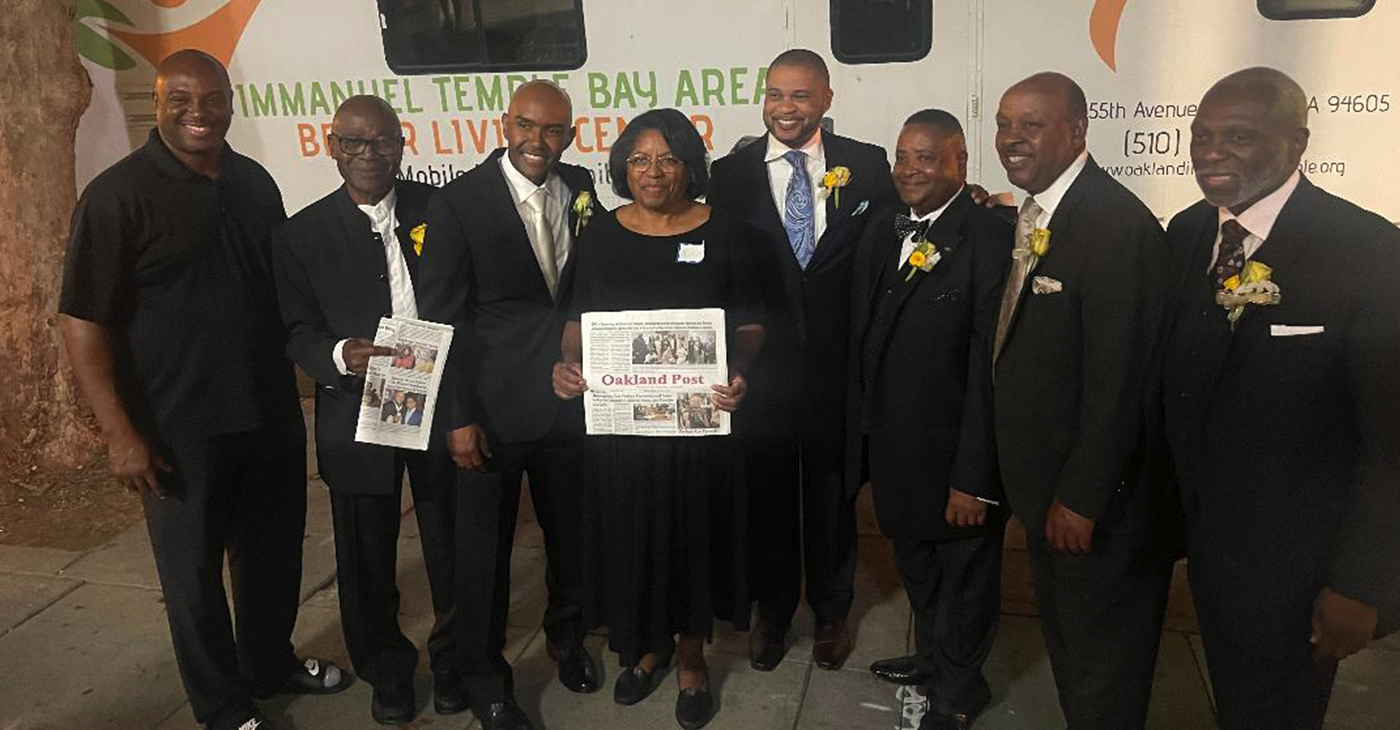
By Post Staff
On Oct. 8, the Northern California Conference of Seventh Day Adventists (SDA) held their annual Convocation at Grand Avenue Seventh Day Adventist Church in Oakland. Seven hundred people came together in celebration and worship. The theme was “Embracing Change.” The guest speaker was Dr. Myron Edmonds, who pastors in Cleveland, Ohio. He spoke about how Christ wasn’t a traditionalist, and the work isn’t being done because some in the church don’t wish to change and they tend to demonize new ideas.
Throughout the day, the Mobile Medical Health Van operated by Immanuel Temple Seventh Day Adventist Church out of Oakland sat in front of the church and provided health screenings and community resource information to the general public. The Medical Van, which was gifted to the church by Pastor Raymond Lankford of Healthy Communities, has provided free health care services throughout Alameda County for the last few years. The prayer of Pastor Damon Washington of Immanuel Temple Church, who was ordained during the afternoon program, is for their health ministry to partner with the other providers like OPIC and Oakland Workforce Agencies and to combat the ongoing health disparities and violence within the city and beyond.
They have pledged to work with the Chaplains, the OPIC and the Formerly Incarcerated Giving Back, who want to make amends for the damages they have done to harm Oakland.
-

 Activism4 weeks ago
Activism4 weeks agoOakland Post: Week of March 27 – April 2, 2024
-

 #NNPA BlackPress4 weeks ago
#NNPA BlackPress4 weeks agoCOMMENTARY: D.C. Crime Bill Fails to Address Root Causes of Violence and Incarceration
-

 #NNPA BlackPress4 weeks ago
#NNPA BlackPress4 weeks agoFrom Raids to Revelations: The Dark Turn in Sean ‘Diddy’ Combs’ Saga
-

 #NNPA BlackPress4 weeks ago
#NNPA BlackPress4 weeks agoCOMMENTARY: Lady Day and The Lights!
-

 #NNPA BlackPress4 weeks ago
#NNPA BlackPress4 weeks agoMayor, City Council President React to May 31 Closing of Birmingham-Southern College
-

 #NNPA BlackPress4 weeks ago
#NNPA BlackPress4 weeks agoBaltimore Key Bridge Catastrophe: A City’s Heartbreak and a Nation’s Alarm
-

 #NNPA BlackPress4 weeks ago
#NNPA BlackPress4 weeks agoBaltimore’s Key Bridge Struck by Ship, Collapses into Water
-

 #NNPA BlackPress4 weeks ago
#NNPA BlackPress4 weeks agoBeloved Actor and Activist Louis Cameron Gossett Jr. Dies at 87





